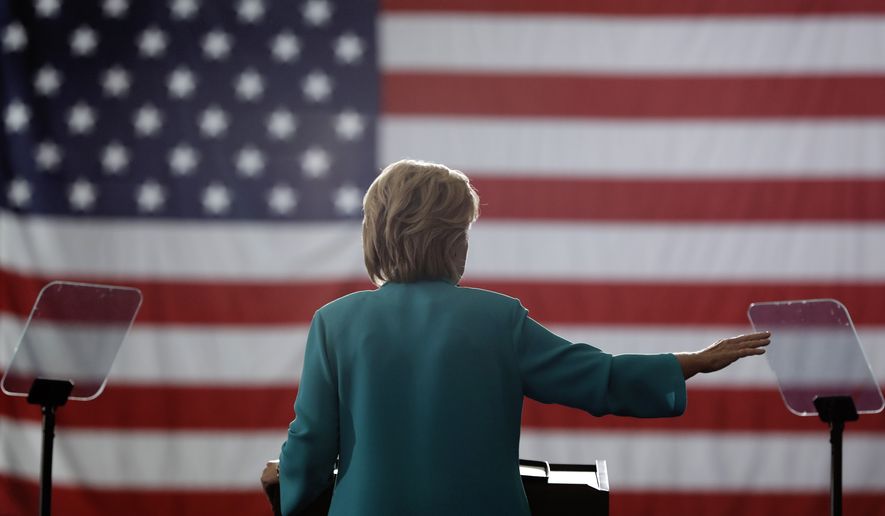Hillary Clinton will get a chance to explain why she continued to use her secret home email account for government business in defiance of repeated security warnings from her underlings — just some of the 25 questions she’ll have to answer, in writing and under oath, to a federal court.
Judicial Watch, a conservative public interest law firm, submitted the 25 questions to Mrs. Clinton Tuesday, and she now has a month to respond under the procedure set by Judge Emmet G. Sullivan.
Among the questions are who “recommended” that she use a secret email account in the first place, whether she ever told the officials responsible for archiving records that she had the secret account, and what steps she took after attempts to hack her account.
Mrs. Clinton could also have to answer whether she destroyed work-related emails.
“These are simple questions about her email system that we hope will finally result in straightforward answers, under oath, from Hillary Clinton,” Judicial Watch President Tom Fitton said in a statement as he released the 25 questions.
Mrs. Clinton eschewed a state.gov account during her time in office and instead used an account tied to a server she kept at her home in New York. That arrangement effectively thwarted open-records laws and shielded her communications from public view for more than six years.
After prodding by Congress, the State Department demanded she return her emails, and she turned over about 30,000 messages she said were work-related, and said she deleted another 30,000 that were personal — and then wiped her server.
The FBI, after a yearlong investigation, recovered thousands of work-related messages it said Mrs. Clinton failed to turn over, and said there may have been others that investigators were unable to recover thanks to Mrs. Clinton’s thoroughness in wiping the server.
Judicial Watch had tried to force Mrs. Clinton to testify in person under oath but Judge Sullivan ruled against that, instead saying that the former Cabinet official, senator and first lady, and current Democratic presidential candidate, could testify in writing.
The questions are supposed to focus on the creation, use and handling of Mrs. Clinton’s emails under open-records laws.
Mrs. Clinton has said she thought her messages were being captured because she regularly emails fellow employees on their official State Department accounts. She estimated to Congress that as many as 95 percent of the messages should have been stored that way.
But her campaign has been unable to back up that number, and Judicial Watch said that has little bearing on the other messages Mrs. Clinton exchanged with those outside of the State Department, whose mail wasn’t part of the department’s system.
“What was your understanding about how such emails would be maintained, preserved, or searched by the Department in response to FOIA requests?” Judicial Watch said in one of its questions to Mrs. Clinton.
The FBI turned over some 15,000 messages it recovered that it said Mrs. Clinton didn’t turn over to the government. It’s unclear how many of those are personal, but at least several dozen are related to the 2012 Benghazi terrorist attack, department lawyers told a federal judge Tuesday.
The State Department is now fending off a barrage of requests to go through the 15,000 messages and release them ahead of the election.
The campaign of GOP presidential nominee Donald J. Trump said the surfacing of additional Benghazi emails was troubling.
“Hillary Clinton swore before a federal court and told the American people she handed over all of her work-related emails. If Clinton did not consider emails about something as important as Benghazi to be work-related, one has to wonder what is contained in the other emails she attempted to wipe from her server,” said Jason Miller, a spokesman for the campaign.
• Stephen Dinan can be reached at sdinan@washingtontimes.com.




Please read our comment policy before commenting.